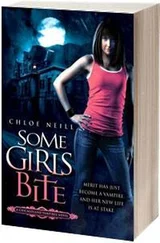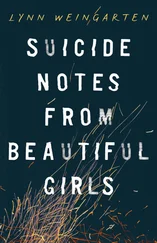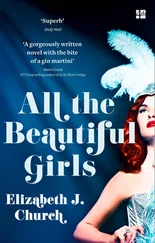He hadn’t wanted drama class; he wanted shop, where they made tool racks and bar stools, but freshmen got leftovers and he was rerouted to the arts. “A thespian ,” the old guidance counselor shouted in J.D.’s ear, handing him his schedule. It would have been intolerable if it weren’t for these girls who filled the seats in front of him. From his seat in the back of the room, he could stare, unseen, at the back of their fine heads and wonder about them.
Two weeks ago, the drama teacher had asked the class to form groups, choose a play from the shelves, and present a scene. J.D. sat quietly, waiting for one of these girls to turn to him, which they were bound to do considering he was one of only three boys in the class; there were boy parts, he knew. But this didn’t seem to matter. He watched as desks were turned and groups sprung up. He watched and waited and found himself alone.
Then Dawn Martinelli poked him in the arm. “I guess you’re stuck with me,” she said.
“I am?” Dawn Martinelli was a big, beefy girl with bad skin, like his, although her pimples were red and mean and gathered in small clusters, while he had a couple of large, sluggish bumps. He knew Dawn Martinelli’s type, from her chicken soup smell to her huffy attitude. He had her pegged.
“You’ll be Vladimir and I’ll be this Estragon,” she said, thrusting a copy of Waiting for Godot at him. “We’ll do this scene where they call each other names. ‘You abortion! You sewer rat!’”
“You lobotomy,” he whispered.
“You butthole,” she said. He inched his chair away from hers, looking at the gray sky. January was one of those months that went on forever.
“We’ll be bums. It’ll be wicked. You’ll see,” she said.
J.D.’s mom dropped him off at the Allards’ at seven o’clock. The house was small and bright with a yellow living room, a little yellow kitchen and a short yellow hallway, sprouting two bedrooms and a bathroom, which were probably yellow as well, J.D. thought. “John Dewey, how are you?” Mrs. Allard smiled. She was cheerful and dumpy, wearing pink lipstick.
The kitchen table had been moved into the living room and a rickety card table was pushed up next to it. Both tables were covered with a paper tablecloth. Six assorted chairs were gathered around the tables, and each place was set with a bowl, a spoon, and a napkin. Mr. Allard in his coat and boots carefully placed a dish of melting butter to the right of the bread basket, then the left. “Where do you think, Johnny?” Mr. Allard asked, when he saw J.D. watching him. J.D. shrugged.
“Girls, girls, John Dewey is here,” Mrs. Allard called.
Shy at first, Annabel and Sophia clung together and whispered into each other’s hair. They wore flannel nightgowns and plaid slippers. Annabel was eight and could be a chatterbox. J.D. remembered her once standing on his shoes and holding his hands, discussing nimbostratus clouds; she and J.D. had dazzled each other with the weather report. Sophia was younger and quieter and had dark, dark eyes. Both girls had chin-length hair and mild cases of static electricity. A couple strands rose, almost elegantly, toward the ceiling.
“We’re having a progressive dinner, J.D. We’ll come back here for stew.” The Allards grabbed their coats, kissed the girls and left. For the first half-hour, the girls colored quietly on the floor, looking up at him shyly, then looking away. “It’s been a long time since we saw you, John Dewey,” Annabel said after a while.
“J.D.,” he said.
“Oh.”
“Do you want a snack?” he asked.
“We had our snack,” Annabel said.
J.D. settled on the couch, opened Waiting for Godot and studied his lines. He’d finally agreed to it because he wanted the class to notice him, notice that he was breathing the same air as they were in the same overheated classroom; he hoped the scene would be funny, and he found he liked yelling insults at Dawn Martinelli. Earlier in the week, though, when they were supposed to be rehearsing their scene, Dawn Martinelli had stared out the window and wouldn’t cooperate.
“What’s the matter with you?” he asked.
“I decided to stop talking so much. I’m trying to cultivate a sense of mystery.”
“Well, you’ll still be weird and boring.”
“I’m not boring,” she said mildly.
“No,” he agreed. Boring wasn’t one of her flaws. “But this is required talking.”
Dawn pointed to one of the groups. “They’re doing The Effects of Gamma Rays on Man-in-the-Moon Marigolds .”
“Who?”
“You don’t know a thing about art, do you?” she said, leaning her fat head close to him and scowling.
“Get out of my face,” he said, inching his desk away.
“You are so blah,” she said, lightly, almost musically. “There’s not one thing about you that’s memorable. You could disintegrate right now and not one person in this room would notice.”
He felt himself get warm, could feel his face reddening. They seemed to instinctively know things about each other that he wished they didn’t know. “I take it back,” he said, as easily as he could. “You are boring.” But he could see they’d both gotten under one another’s skin, and for the rest of the week they spent third period drama class alternately rehearsing their lines and saying terrible things to each other.
Now just looking at the lines made his heart sink. He didn’t know what to make of high school, where he walked the halls like a phantom. He closed his eyes for a moment and then looked over at the Allard girls, who were watching him expectantly. They smiled, looked down into their coloring books, and then looked up again.
“Annie Fofannie, Sophster,” he said, suddenly, tossing aside the book. “Let’s have some fun.”
The girls jumped to their feet. First they played Evil Baby Snatcher—an escaped jailbird who was as slippery as smoke, passing under doors and through cracks, tried to enter the Allard home and seize the girls. The girls had to spot Evil Baby Snatcher before it got a stranglehold on one of their little necks. Sophia would point to the shadowy, lurking snatcher while Annabel bugged out her eyes and let herself come close to death by asphyxiation. J.D.’s job was to wind up his pitching arm and send Evil Baby Snatcher sailing through the window and out onto the telephone pole, where they would listen closely and try to decipher its evil words and prepare themselves for the next attack. Next, they played Smokers, a game where they sucked on pretend cigarettes and hacked their brains out and talked in raspy voices.
Then the girls dragged two boxes that were each marked $1 into the living room. “We got this junk at a rummage sale,” Annabel said. Inside one box were many pairs of dress shoes, now old and crunched and dusty. The other box held hats and purses and accessories. All of it smelled liked someone’s basement.
Annabel flipped through the stuff and draped herself in a fox wrap—the old, sad, toothed head sat on one shoulder and its ratty tail hung off the other. She wore a beaded beret and pointy-toed satin slippers. J.D. found a beat-up motorbike helmet and goggles.
“Miss Vanilla Bean,” he said, getting down on one knee. “I would do anything for it not to be true, but what we had here is over.”
“Noooooooo,” Annabel said, throwing herself onto the recliner, writhing and moaning, her nightgown twisting around her pale legs. “You have to staaaaay…”
“I’m sorry,” J.D. said. “We’re kaput.”
She threw herself at J.D.’s feet, her mouth opening and searching for words. “But tomorrow it will be sunny, a warm front is moving in and we might make it to the low fifties.” He shook his head sorrowfully.
Читать дальше










